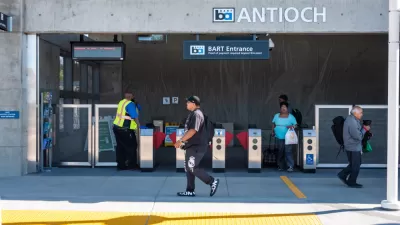A new bill would grant the Housing Alliance for the Bay Area taxing authority to raise revenue in the nine-county region to find solutions to the housing crisis. Another bill would reduce the voter threshold below two-thirds for eligible taxes.

A regional attempt to address the housing crisis in the San Francisco Bay Area by the Committee to House the Bay Area, called CASA (Spanish for "house"), cleared three formidable hurdles in December and January. The committee has since taken their ambitious, multi-pronged housing agenda to the state capitol to tackle their next challenge: state legislation.
"I think we need to have a regional approach," Assemblyman David Chiu, D-San Francisco, the chair of the Assembly Committee on Housing and Community Development, told KQED News reporter Guy Marzorati on Jan. 23.
To raise money for the proposals, the CASA Compact [pdf] suggests the creation of a new Bay Area housing agency, led by elected officials but also including developers and tenant activists, which would levy regional taxes and distribute funds.
A month later, Chiu introduced Assembly Bill 1487, titled "Land use: housing element" on March 10, that appears to be a placeholder for the creation of a regional housing agency to be called the Housing Alliance for the Bay Area (HABA), "with the ability to impose regional taxes to fund development, local planning and tenant assistance," reports Marzorati on March 7 (source article).
AB 1487 would give state authority to HABA to raise up to $1.5 billion through ballot measures voted on in all nine counties.
"[It] would allow for funding to be raised regionally and spent regionally," Chiu said. "It would allow tenants from across the region to access services, even if their city doesn't have tenant services available..."
The entity would not have any land use authority, and while it could purchase land for affordable housing, it would not be able to take property through eminent domain.
Individual cities and counties have been addressing the housing crisis individually by going to their voters. However, the two-thirds requirement by Propositions 13 and 218 is a high hurdle to achieve for most tax and fee measures. Fortunately for CASA, "[a] separate bill in the state Legislature could make it easier to pass a regional housing tax," adds Marzorati.
Assembly Constitutional Amendment 1 would lower the threshold needed to pass a sales tax or parcel tax from two-thirds to 55 percent, if the funds are used for infrastructure or affordable housing. [ACA 1 would also need to be approved by a majority of statewide voters.]
Housing shortage
"Since the recession ended in 2009, the Bay Area has added 722,000 jobs but built only 106,000 homes, an imbalance that’s had severe consequences," writes Rachel Swan for the San Francisco Chronicle. The CASA Compact "calls for production of 35,000 homes a year, including 14,000 that are affordable to low-income families, and 7,000 that are affordable to moderate-income families."
The [CASA] panel also called for preservation of 30,000 units of existing affordable housing, and protections for 300,000 households that are on the verge of getting displaced.
CASA estimates that the Bay Area needs to fill a $2.5 billion funding gap to meet its affordable housing goals. If it passes, AB1487 would provide more than half that money, and Chiu hopes that other state and local measures would provide the rest.
If AB 1487 should pass, and presumably be signed by Gov. Newsom who has called for developing 3.5 million new housing units by 2025, local cities could still balk at meeting the regional housing goal.
"Right now there is no real mechanism for the state to override local land-use authority," adds Swan. "When Newsom proposed withholding transportation dollars from cities that don’t meet their housing targets, he ignited a political flame war."
"A survey released last week found the median rent for a one bedroom apartment in San Francisco had risen to $3,690 a month, a figure about 30 percent higher than in New York," reports Tim Fang for CBS San Francisco on March 7.
Hat tip to Streetsblog California.
FULL STORY: Push to Create a Regional Housing Agency for the Bay Area

Study: Maui’s Plan to Convert Vacation Rentals to Long-Term Housing Could Cause Nearly $1 Billion Economic Loss
The plan would reduce visitor accommodation by 25,% resulting in 1,900 jobs lost.

Alabama: Trump Terminates Settlements for Black Communities Harmed By Raw Sewage
Trump deemed the landmark civil rights agreement “illegal DEI and environmental justice policy.”

Why Should We Subsidize Public Transportation?
Many public transit agencies face financial stress due to rising costs, declining fare revenue, and declining subsidies. Transit advocates must provide a strong business case for increasing public transit funding.

Paris Bike Boom Leads to Steep Drop in Air Pollution
The French city’s air quality has improved dramatically in the past 20 years, coinciding with a growth in cycling.

Why Housing Costs More to Build in California Than in Texas
Hard costs like labor and materials combined with ‘soft’ costs such as permitting make building in the San Francisco Bay Area almost three times as costly as in Texas cities.

San Diego County Sees a Rise in Urban Coyotes
San Diego County experiences a rise in urban coyotes, as sightings become prevalent throughout its urban neighbourhoods and surrounding areas.
Urban Design for Planners 1: Software Tools
This six-course series explores essential urban design concepts using open source software and equips planners with the tools they need to participate fully in the urban design process.
Planning for Universal Design
Learn the tools for implementing Universal Design in planning regulations.
Smith Gee Studio
Alamo Area Metropolitan Planning Organization
City of Santa Clarita
Institute for Housing and Urban Development Studies (IHS)
City of Grandview
Harvard GSD Executive Education
Toledo-Lucas County Plan Commissions
Salt Lake City
NYU Wagner Graduate School of Public Service





























